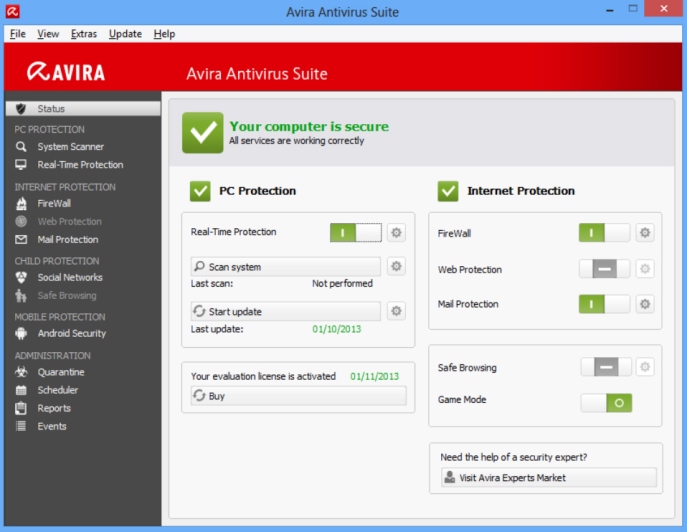How to protect yourself from viruses

Well, not you, you know, but rather your digital devices. It came up in class and I was asked again by a few of you as to what programs are available to guard against malware that might infect your machine, so I thought would offer some suggestions.
First, I advise against paid services for your home machines, especially Norton/MacAfee/Symantec. There are many free alternatives that work very well, while those big ones and their ilk are dilettantes, wanting to protect your machine and monitor ports and watch incoming/outgoing traffic and monitor webapges and it ends up using a ton of computing resources and they’re difficult to uninstall, leaving traces of themselves all over your hard drive and registry. The free options have paid versions, but as an individual user you don’t need them, and their virus definitions, which allow them to recognize viruses, are updated just as often.
Also, please be aware that any digital device can be infected with malware, and for those who think Macs are immune I have some bad news for you as well.
Having gotten that out of the way, I have provided some alternatives below. Keep in mind that each of these offers strong virus protection, but their features beyond that are usually pretty comparable, such as HTTP scanning to protect you against visiting malicious webpages, and real-time system monitoring. You also want to be sure the virus definitions are always up-to-date, and in fact right after installation of any of these that’s the first thing that will happen, then set them to update automatically. Ultimately, the one that is best for you depends on what you need and what you want.
One final thing, absolutely do not run more than one simultaneously! Not only will it unnecessarily tax your system resources, they’ll try to scan each other interfering with their ability to perform their tasks and possibly providing false positives.
And now, your choices!
AVG has been around for a long time, and they recently updated their interface to bring it more in line with modern design trends. Their malware detection and removal is effective, it actively monitors your system and your browsing (it even claims to monitor your Facebook browsing), and it has been around for a long time. They have a free version for individual users which can be downloaded from the link provided above.
Bitdefender (PC)
Bitdefender is another stalwart product that has been around for quite some time and is quite popular as an antivirus tool as well. They have also expanded their capabilities, and according to their webpage they will even monitor for rootkits, which are subversive programs that let people access your machine, and it even claims it can determine unknown threats based on how regular programs are supposed to work. Either way, it has been long-trusted as an anti-virus program.
AVAST has been around, in one form or another, longer than all the others. While it’s antivirus capabilities are very strong, there are some opt-ins during installation you want to watch out for; it’s best to choose a custom installation and un-check anything you don’t want. Strictly speaking as an antivirus service, it works very well.
Avira (PC / Mac / Android / iOS)
Although you don’t hear the name Avira all that much, it has been around since the 80’s and is very highly regarded as an antivirus program. It has a small footprint, smaller than most of the others even, meaning it uses less resources (generally) than many of its competitors yet still offers a full suite of protection options. I personally don’t have as much experience with this one as much as the others, so if you’re the experimenting type you can let us know how it worked for you!
Windows Defender (PC, obviously)
Windows Defender is a new program in the grand scheme of things, only becoming available for the first time with Windows Vista, however if you have Windows it’s likely all you need. It can be activated/deactivated from the ‘Action Center’ under ‘System’ settings in the Windows Control Panel. Surprisingly enough, it works very well and is as effective as the other programs I’ve listed, but it doesn’t provide any feedback or too much interaction, while the other programs listed provide a lot of information, detail, and hands-on control.
Malwarebytes AntiMalware (PC)
Very well known, well respected, and well trusted, Malwarebytes Antimalware is an anti-malware program, however the free version needs to be run manually. In other words, while all the others offer real-time monitoring, this one doesn’t, you have to run a scan deliberately. However, it is so well regarded that many people do a once-a-week scan using Antimalware, in addition to their regular protection with one of the others.
That’s all I have for now. Although it’s just a list with some brief comparisons and explanations, hopefully it provides a starting point. Remember, whichever you use is really a personal choice; they’re all comparable and it depends on which one you feel the most comfortable with. Experiment (but don’t use two at once!) and see what you think. The more security becomes an issue, the more you will need this type of thing.
Be sure to do an initial deep scan once you’ve installed your choice!







